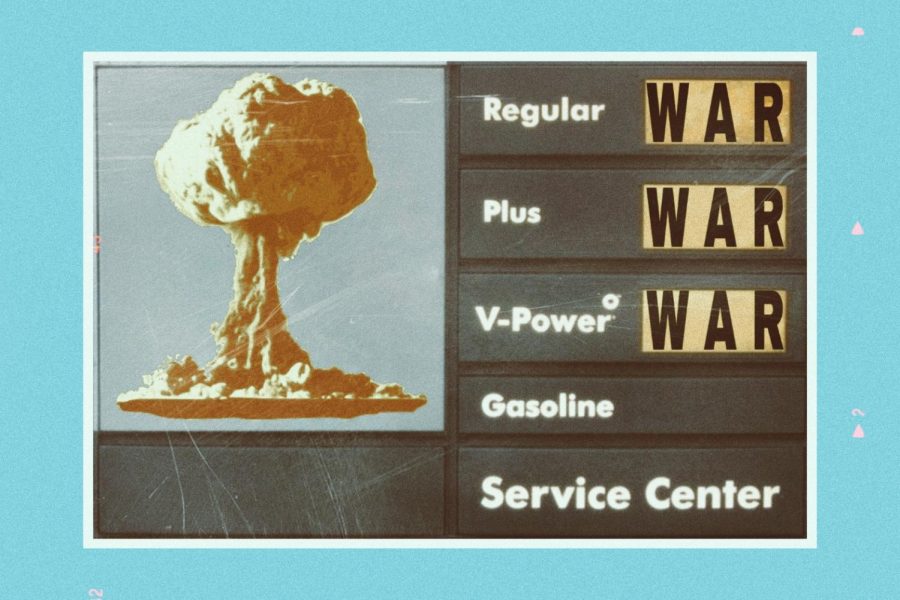Gas Prices Are Rising. Good.
The rise of autocracy is not something we can watch passively
For the past three weeks, the world has watched Russia unfurl a full-scale invasion on Ukraine. The largest conflict in Europe since World War II and the first war to be scrutinized by ubiquitous cellphone footage, devastating scenes have filled social media. Tanks rolling through ravaged streets, helicopters soaring above battered cityscapes, indiscriminate shellings of soldiers and citizens alike and a myriad of other horrific wartime occurrences have never been so easily observable. Leaders around the globe have responded by imposing tough sanctions on Russia, including on their gas and oil exports, which will affect the already climbing fuel prices in the United States. Although exuberant gas prices are nothing to smile at, the cause of the inflation is something to commend wholeheartedly.
On Aug. 9, 2020, the streets of Belarus erupted with massive protests after a government-run TV exit poll announced that Alexander Lukashenko, the incumbent candidate, had won the presidential election with 80% of the vote – an implausible figure due to the nebulous nature of the election, the nation’s history of illegitimate polling and his challenger’s popularity.
Sviatlana Tsikhanouskaya, primary challenger and likely legitimate winner of the election, was forced out of the country, internet access was restricted and the hordes of protestors were met with violent police pushback. Despite the authoritarian crackdown, Belarusians continued to fight against the rigged results, triggering foreign interference on behalf of the government.
Nine days after the election and subsequent backlash, a Russian government plane flew from Moscow to Minsk. After the plane’s departure, Lukashenko’s government began using new, harsher methods to dispel the crowds.
Belarusian journalists were replaced with Russian-provided reporters who quickly changed the narrative surrounding the protests. The Kremlin dispatched Russian forces to aid Belarusian police. Suddenly, Lukashenko’s government was using techniques that Russia has infamously used to extinguish protests.
Despite Western sanctions and persistent public dissent, Lukashenko remains in power, leaving Belursian democracy effectively squashed.
In 2014, Ukrainian protestors overthrew Viktor Yanukovych and his regime after he had prevented Ukraine – with the intention of furthering reliance on Russia – from joining a free trade agreement with the European Union. Immediately following Yanukovych’s deposition, Russian forces invaded the nation and annexed the region of Crimea.
These two incidents, although not the only cases of Russian interference, emphasized the necessity of democratic opposition in the face of a growing cabal of autocratic governments.
When an authoritarian government acts unlawfully, the nations of the world typically respond with a cascade of sanctions as a penalty. This leads the said nation to strengthen relations with similarly-structured countries. For example, following Western condemnation, the governments of China, Iran and Cuba reinforced ties with Belarus.
Venezuela, an autocracy targeted by Western sanctions, is provided economic support from Russia and China. Turkey buys their gold and Cuba provides their leaders with security details.
Turkey, sanctioned by the U.S. for conducting transactions with Russian arms dealers and by the EU for illegal drilling, has strengthened ties with Russia and was recently funded $1 billion by China.
Freedom House, a non-profit research organization, found that in 2020, democracy declined in 73 nations, following a 15-year trend. The 2021 report concluded that “less than 20 percent of the world’s population now lives in a Free country, the smallest portion since 1995.”
Democracy, although an imperfect system, is the greatest structure of government available; particularly so in comparison to autocracy. The will of the people should not and cannot be oppressed by self-interested despots looking to increase their power and wealth. As the tyrannical governments of the world intensify their alliances and presence on the world stage, it is vital that democracies counter them by doing the same.
And so, it is of utmost importance that the U.S. and its allies stress their commitment to defending democracy. Russia’s bumptious nuclear arsenal is the only barrier impeding a reasonable justification of military intervention. The West cannot militarily oppose Russia without running the risk of nuclear armageddon at worst and a global conflict at best.
Thus, economic alienation is the next best option.
Coinciding with the U.S’s historic rate of inflation, the sanctions on Russian gas and oil are untimely and will force average Americans to foot the bill. However, a poll conducted by CBS News found that a majority of Americans are supportive of the sanctions even if it means an increase in domestic prices. This, in itself, is noteworthy considering a decent chunk of Americans contemplate storming the Capitol every time the price for a carton of milk rises a few cents.
The decision to impose sanctions having major and bipartisan support is a good indicator of the public’s understanding of what is at stake. When it comes to an emergency occurring in some faraway land that does not have an immediate and material effect on the country, far too many people detach and allow apathy to dictate their opinions on the matter. As a result, a dispassionate and individualist demographic is sowed into the general population, pulling in the direction everyone else is pushing in during times of crisis. So, it is encouraging to see a majority of people willing to pay a personal price in exchange for economic justice.
The individuals that understand what is at stake but still detest the sanctions should reevaluate the situation and come to a better conclusion. It is better to go and see rising prices than to go out and see rising mushroom clouds pluming over the horizon and reducing everything in sight to radioactive ash.




gabriel • Apr 20, 2022 at 1:17 pm
Good read! I like your point of sacrificing a higher price at the pump for security. Countries not facing war are lucky to not face daily uncertainty about food, health and living. Our troubles now seem very insignificant compared to Ukraine.